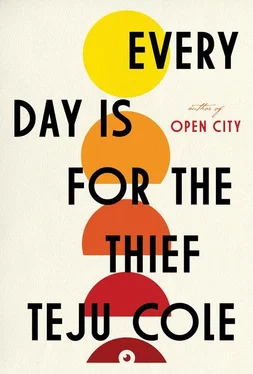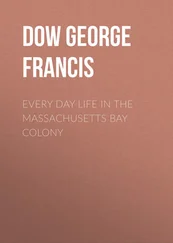He stretches out further on the sofa. He looks wiped out. What he says about the economy is true. The oil and gas business rakes in lurid profits, there has been a great increase in cellphone use, and the banking sector is frenetic. The newspapers are full of mergers and acquisitions. These are the limits of the boom. It is good news in the sense that increased commerce is creating jobs, that the economy is active, and certain practical needs of the people are being met. Things are not as stagnant as they were in the dark days of the early and mid-nineties. But there are now more serious discrepancies in income levels, even among people with comparable educational qualifications. There is little incentive for people to go into professions that are not lucrative. Consumption, among those who can afford it, is conspicuous.
We drink. There is much to talk about, and little, as happens when two friends haven’t met in a long time. I ask him if it’s been a long drive from the island.
— Yeah, really long, man. Why do you say that? Do I look so tired? You have to time Lagos driving just right, getting on the bridge. You leave too late, a forty-minute journey could easily become two hours. Sometimes more.
— That is just crazy. But at least your car is air-conditioned.
— Ha! No chance.
He shakes his head. We look at each other. And just at that moment there is a power cut and we both disappear.
Rotimi accompanies me to the generator house. In the soot-covered concrete enclosure, we discover that there is just enough diesel in the machine for an hour of electricity. Then darkness until the morrow. I tell him I’m sorry about this. But why, he asks, should you be apologetic? I live in Lagos, I’m used to power cuts. Then he offers to drive me to a filling station. He won’t be dissuaded.
The mind roams more widely in the dark than it does in light. It is no surprise, then, stepping out of the unlit house into the unlit compound to find myself with the sudden thought, What if I inhabited another body and had a different destiny? We have all had these notions, perhaps while standing on a porch over a lake in the summer night as our friends enjoy a party indoors, or maybe on waking alone at three in the morning. Moments of great isolation. And there is that other thought: What if everything changed tonight? What if there is an explosion in the generator house? Nighted color seeps into the mind.
The backseat of Rotimi’s car, an old Toyota, is full of papers and medical books, including some for foreign exams. I put a large jerry can into the trunk. From the Ojodu — Berger terminus we connect to the Lagos — Sagamu Expressway and travel in the direction of Lagos. After ten minutes, we exit at Ogba and drive to the nearest filling station, but they have no diesel. We drive around that neighborhood, and at the next three stations the story is the same. Either the station is closed, or they are open but have no diesel. Half the city runs on diesel generators, and Nigeria is one of the world’s leading producers of crude oil. The shortages make no sense.
Finally, we get back on the expressway, traveling in the opposite direction. In about five minutes we find a place that has diesel. I am impressed by the way Rotimi talks to the woman at the pump. He falls into a casual vernacular that erases the social distance between them. The message, unmistakably, is that we need her, that it is in her power to help us out. Diesel is advertised at seventy-seven naira per liter. I tell her we want two thousand five hundred worth, and she carefully fills up the jerry can until the numbers on the pump tick exactly to two five. I thank her and pay with a pair of thousand-naira notes and a five hundred. As we pull out of the station and onto the highway Rotimi laughs and says:
— You noticed what just happened, right?
— Um, no. What?
— How much did you pay?
— Two five. That’s how much I wanted, and that was the reading on the machine. So don’t worry, I had my eye on things.
— Okay, yes, but did you see the advertised rate?
— Sure, it was seventy-seven.
— And how big was your jerry can? Twenty-five liters, abi be ko ?
— Ol’ boy, I don’t see what you’re driving at.
— You had your eye on things! Omo , do the maths.
So I do. Twenty-five at seventy-seven only comes to nineteen twenty-five. Christ. She’s just had us for almost six hundred naira, easy as that. Rotimi chuckles again and says:
— Don’t sweat it, that’s just the way it is, man.
— This damn country.
Somehow, seeing the advertised rate set into the pump, and seeing the pump tick up the numbers, made me think that everything was clean and official.
— We couldn’t have done anything about it. That’s just the way it is, she has to have her own cut. It saves us the trouble of having to tip her.
He laughs again. I am a little annoyed, but I have to marvel at how brazen it all is. So I smile too, and swear again. We cruise on the highway, red lights twinkling directly ahead of us, the white headlamps of oncoming cars flashing to our left. And as we approach Isheri, I say what has been weighing on my mind all evening:
— Rotimi, how did you deal with the, I mean, how did you cope with Sola’s death?
The unspoken thing. I haven’t seen him since it happened, in 1993. From the late seventies and for most of the eighties we were a close-knit crew. Their mother and my father had gone to school together, and when they’d had us three boys within the space of three years, it was natural that close friendships would ensue. And so, the Bamgbose boys are there in those early photos, my fifth birthday, his brother, Sola’s third, someone else’s tenth. Sola was the youngest of us three, he was the runt, the one we teased constantly, a rambunctious, happy kid. They were always there with me, as the photos went from black-and-white prints to the washed-out colors of the Polaroids, wearing the same bow ties and ruffled shirts that our mothers made us wear to those parties. The lights of the Lagos night interrupt the darkness of the car at intervals, as though we were passing under scanners. Rotimi’s face takes on that guarded, distant look that I know so well. But when he starts to talk, it is clear that he wants to open up.
— It was very difficult. You know, he and I were in the same class, in spite of our age difference.
— I never did know what happened exactly. An accident at that boarding school in Abeokuta, right?
— Yes. We were in SS One. I had just turned fifteen, and Sola was fourteen. He was always one of the youngest kids in class. Anyway, one of his friends, a day student, had brought a car to school to impress the boarders with. Which, of course, wasn’t allowed. And somehow or the other, the car stopped working, developed some fault. So the boy who brought it gets into the car, and the other boys, there are three of them, start to push the car. They finally get it to start, and the three boys stop pushing. They climb up on the trunk for a laugh. But the boy inside the car doesn’t see them do this, and he just accelerates and drives off.
We come off the expressway, and ease the car into the congested bus terminus near the housing estate. Rotimi speaks dispassionately, but the weight of the event is still there in his every word. It is about nine at night. The danfos are still active at the terminus, the bus touts are still crying out, but in fewer numbers than during the previous hour.
— All three boys fell off the car. Two of them did not have a scratch. But Sola somehow slammed his head on the road.
— My God.
— And that evening was weird, you know. No one could tell me what had happened. Everyone knew, but I didn’t. I was there in the dining hall, and boys were offering me their seats, serving me larger portions than usual. It wasn’t normal. I knew something was up. Eventually, one of the prefects took me aside and said my brother had had an accident, that he had been taken to the general hospital in town. And, of course, my parents came to pick me up the next morning.
Читать дальше












